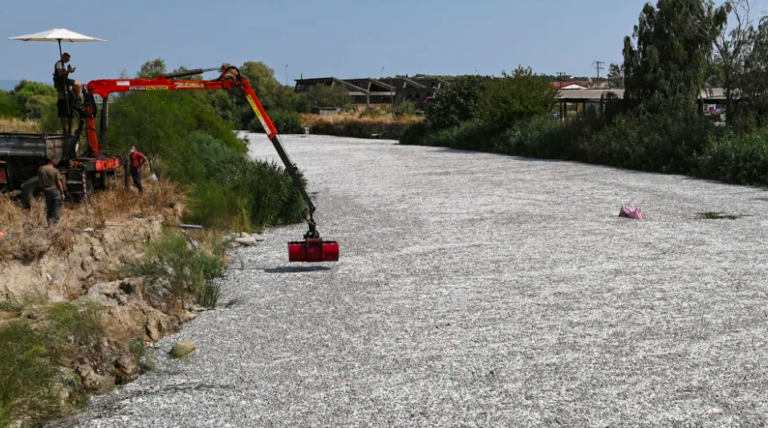Translation:
The repulsive images of dead fish from Lake Karla ending up in the Pagasetic Gulf near Volos have made headlines in international media over the past 24 hours. These reports describe the causes of the phenomenon, the ensuing conflict, and the severe impact this issue has on local businesses.
The primary cause of this pollution is the fact that the sluice gate of Lake Karla remained open for an extended period. As a result, the polluted waters of the overflowing lake, along with the freshwater fish, are flowing into the sea and the Pagasetic Gulf. The Volos Prosecutor’s Office has ordered an urgent preliminary investigation into the dead fish. They will examine the quality of the seawater, conduct tests in accredited laboratories, measure the microbial load at the lake’s outlet, and investigate whether there is pollution, as well as the cause of the fish deaths, including the possibility of toxic substances.
What international media are reporting
“Greek tourist port flooded with hundreds of thousands of dead fish,” reads the headline of a Guardian article, which also highlights the concerns of local restaurant owners.
The dead fish caused a strong odor that alarmed residents and authorities, who rushed to collect them before the smell reached nearby restaurants and hotels, the article mentions.
The author, citing local authorities, notes that over 40 tons of fish have been collected in the past 24 hours.
“Thousands of dead fish cover a port in Greece” is the title of a video on the BBC website, while British Channel 4 also covered the rare phenomenon caused by the extensive floods in our country.
The French Press Agency, which publishes shocking photos from the port of Volos, speaks of a “race against time” by the authorities to resolve the issue.
The phenomenon of dead fish has also been covered by The Independent, Deutsche Welle, and Il Messaggero, which referred to it as an “ecological disaster.”
Reuters reported on the causes of the phenomenon: “Experts said the problem was caused by last year’s historic floods that hit the Thessalian plain further north, affecting rivers and lakes. A net had not been placed at the mouth of the river leading to Volos, they said. When the fish encountered the sea, the salty water likely killed them.”
Translation:
As these images of dead fish in the Pagasetic Gulf are being broadcast internationally, the Magnesia Hotel Association has issued a letter supporting those who express outrage over the issue of the dead fish that have been floating on the surface of the Pagasetic Gulf for days.
In its statement, the Hotel Association warns that this phenomenon could be the “final blow” to tourism if collective and immediate actions are not taken. It also notes that it is exploring legal options to file a lawsuit against any responsible parties and a claim for the total defamation of the region.
Read the letter below:
“The Magnesia Hotel Association sounded the alarm from the very beginning about the disaster threatening the Pagasetic Gulf following the floods of Daniel and Elias. Recently, the issue has taken on massive proportions. We have all witnessed the unimaginable and macabre sight of dead fish along the shores of Magnesia.
We requested through letters, and even before that, through immediate phone calls with the Chamber President, that the issue be investigated. Not immediately but ‘yesterday,’ because it critically affects the course of tourism in our area. We asked the Port Authority of Volos to collect the dead fish and debris as soon as possible. Their response was that arrangements have been made by the Port Authority with the responsible agencies to address the phenomenon, and the pace of cleaning has been increased. We leave it to your judgment.
It is unacceptable that once again such horrifying images from our Magnesia circulate online, and we repeatedly become victims of incalculable defamation of our region. As a result, we are compelled to explore with our legal team the possibility of filing a lawsuit against any responsible parties and a claim for total defamation of the area.
Following our investigation into the matter, the Magnesia Hotel Association is the organization that requested from the Thessaly Regional Governor and proposed the permanent closure of the dam (as the ministerial decision clearly states that the dam should only be opened in emergencies) in the face of this situation. The Magnesia Hotel Association aligns with all the entities that are reacting and expressing their collective outrage, such as the Magnesia Chamber of Commerce, the Restaurant Association, and other professional bodies regarding the issue of the dead fish that have been floating on the surface of the Pagasetic Gulf for days, defaming the region nationwide. This phenomenon will deliver the ‘final blow’ to tourism if collective and immediate actions are not taken.
We consider the development in which the Region, following the emergency meeting, adopted our proposal to close the sluice gate as positive.
A definitive end must be put to this enormous problem that creates anxiety and sadness not only for our members and visitors but also for the residents of Magnesia.
It is not only the future of the Pagasetic Gulf and its ecosystem at stake. It is the future of Magnesia and Thessaly.
We reiterate that we reserve all our legal rights.”
Ask me anything
Explore related questions





